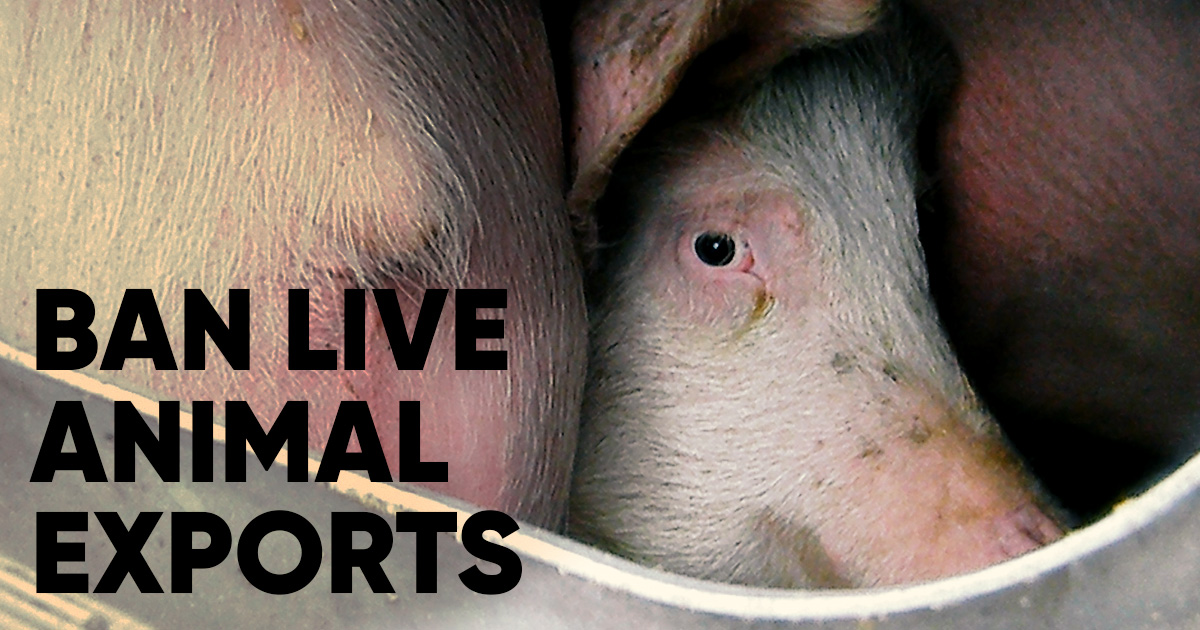Ban live animal exports

To the European Commission, Manfred Weber (chair of the EPP group), Iratxe García Pérez (chair of the S&D group) and Stéphane Séjourné (chair of the Renew Europe group)
Petition
WE, THE UNDERSIGNED, call for a revision of transport regulation and immediate action to address the worst animal welfare issues. The revised EU Transport Regulation should provide the following:
- An immediate ban on the export of live farmed animals to third countries for fattening and for slaughter;
- Live transport journey times to be limited to a maximum of eight hours and four hours only for poultry, by 2024, with investment in well-managed local and mobile slaughterhouses to reduce travelling times;
- A ban on transporting unweaned animals;
- More unannounced checks and tougher sanctions for infringement;
- A prohibition on live transport if expected outside temperatures are below 5˚C or above 25˚C;
- Strict enforcement of the Regulation.
The issues of long-distance live animal transport and live exports should also be addressed in the context of:
- European Commission objectives to urgently improve animal welfare and to improve public access to healthier diets with less meat;
- European Union international commitments on climate change and sustainability, including food security – the EU should not market live animals or animal products from harmful and polluting industrial farming systems to third countries.
And direct action against live exports should be accompanied by significant reductions in the numbers of farmed animals in the EU, to reduce the need for transporting and exporting excess livestock.
Why is this important?
200,000 cows, sheep, and other farmed animals crowded and packed together in sweltering conditions, starved to death on ships as their food ran out. They died a few months ago after waiting for the Suez Canal to reopen. Most of them came from Europe. [1]
All of this is due to the live export trade. Animals are subject to unimaginable suffering, crammed into ships and sent around the world, usually just to be slaughtered for meat and leather on arrival. [2]
New Zealand has already banned live export, and the UK is also planning to do so. As momentum builds for a global ban, the EU is investigating current rules on live export that could lead to an effective ban. [3]
What happened in the Suez Canal isn’t an isolated example of tragedies like this. In December 2020, nearly 3,000 calves left a Spanish port but were denied entry to several countries. They were stranded at sea for three months in shocking conditions, and eventually taken back to Spain for slaughter. [4] In November 2019, nearly 15,000 sheep drowned below deck when their ship capsized after leaving Romania. [5]
But even when there aren’t incidents like this, these journeys are still tragic. Animals are exported under severe stress, and may face extreme dehydration, exhaustion, hunger and death – even without unexpected delays and capsizing. Those that survive these grueling journeys often then face slaughter.
References:
- https://euobserver.com/world/151394
- https://www.theguardian.com/environment/2020/jan/20/live-export-animals-at-risk-as-giant-global-industry-goes-unchecked
https://www.bbc.co.uk/news/uk-54435029
https://www.peta.org/issues/animals-used-for-clothing/wool-industry/wool-live-export/ - https://ec.europa.eu/food/animals/animal-welfare/evaluations-and-strategy/evaluation-eu-legislation-welfare-farmed-animals_en
https://www.theguardian.com/world/2021/apr/14/new-zealand-to-stop-exporting-livestock-by-sea
https://www.theguardian.com/environment/2020/dec/03/uk-to-become-first-country-in-europe-to-ban-live-animal-exports
https://www.theguardian.com/world/2021/may/12/animals-to-be-formally-recognised-as-sentient-beings-in-uk-law
https://www.animalsaustralia.org/investigations/live-export-investigations.php - https://www.theguardian.com/environment/2021/mar/31/how-nearly-3000-cattle-came-to-be-stranded-at-sea-for-three-months
- https://www.theguardian.com/environment/2020/feb/03/secret-decks-found-on-ship-that-capsized-killing-thousands-of-sheep
In partnership with:
